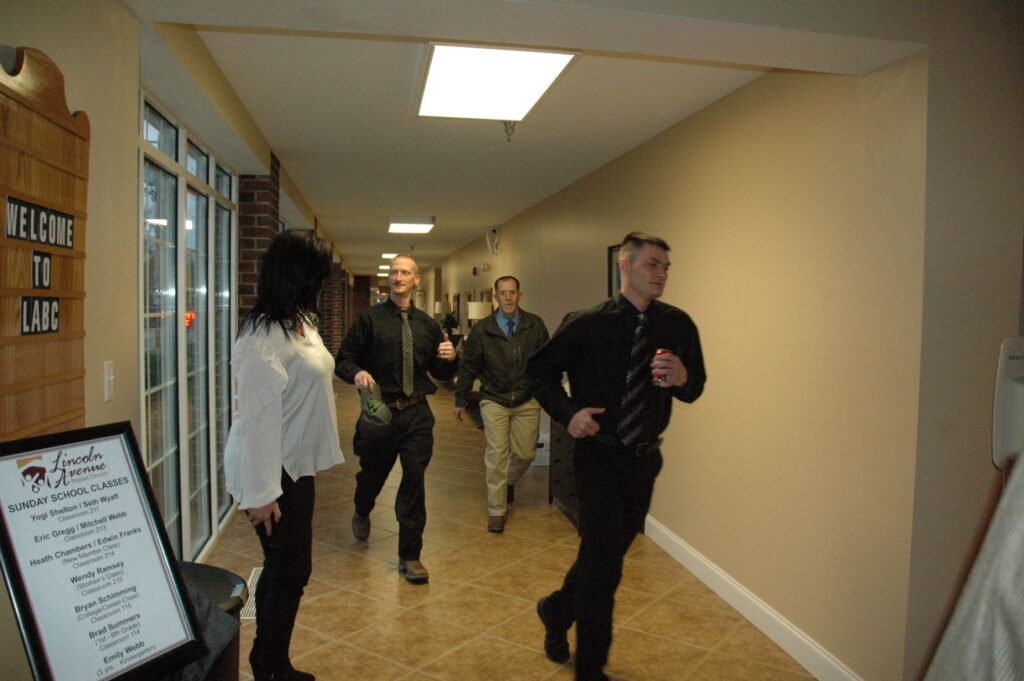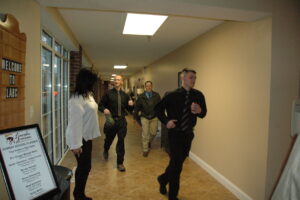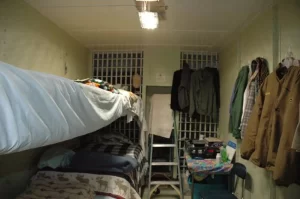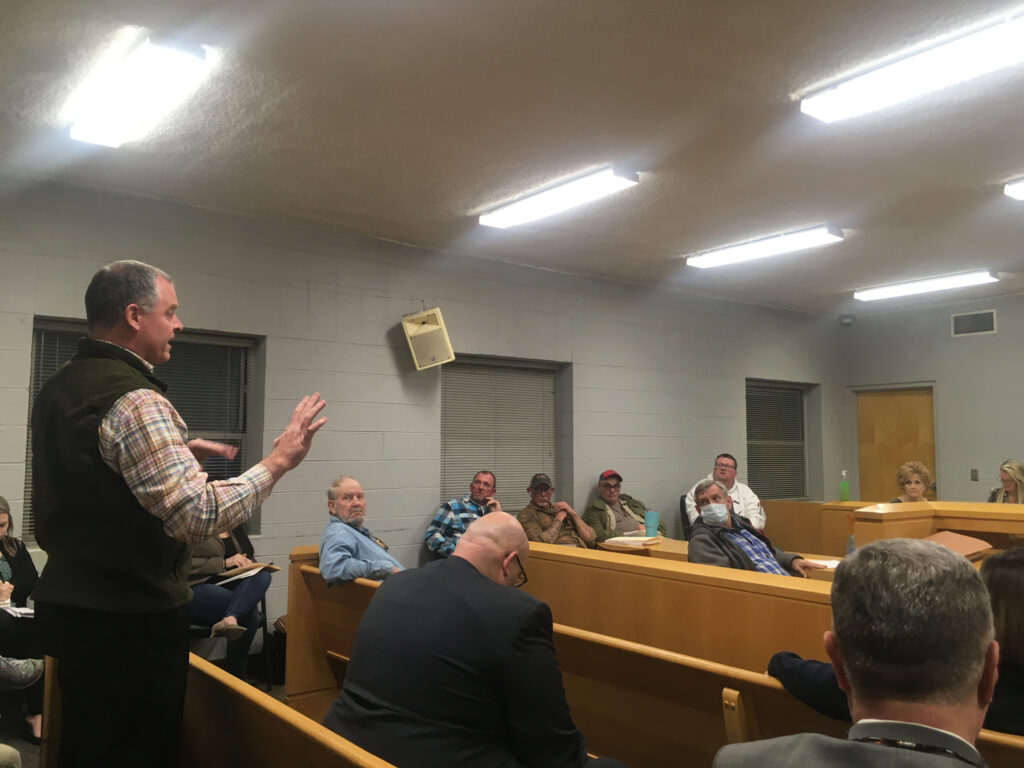
NEWPORT, Tenn.—Nine men graduated from an addiction program Friday at the Lincoln Avenue Baptist Church, and are now advancing to the next stages in their recovery. They are not to be considered out early, but have instead earned their place back in society through layers of hard work, proven sobriety and a commitment to improving themselves, by way of a new recovery system in the county jail, known as the Tennessee Jail Chemical Addiction Program, or JCAP, which started last summer.

Newport native William Dalton Hall, 25, is the youngest of nine men to graduate Friday night. A musician with a range of talents, Hall told an audience of about 100 how his struggles with addiction took relationships from him.
“I’ve burnt bridges, whether it’s been my family, my friends, my wife—but I believe God’s going to bring all that back together,” Hall said, to exclamations of praise.
Someone called out from the congregation. “Come on,” he said loudly, with jubilation in his voice. From the middle of the room, another man shouted, “Amen!”
Hall continued.
“This class has really taught me you have to put God first. You have to have something that is going to be your driving force, and once you get God in your life, then you’ll be able to put yourself there. You’ll be able to tear down the strongholds. You’ll be able to examine yourself: all your bad flaws, all your bad habits, and then you’ll be able to take control of them so you’re not living in the past no more. You’re just going to be focused on your future, and where you’re going.”
With a stern demeanor, Hall said he wants to attend trade school, get a house and rejoin his family. Six graduates from the previous class – the first of its kind – sat behind him on stage, quietly supporting from the choir section. To be allowed back on the stage, they are also passing drug tests, and adhering to all program rules.
All men on the stage overcame many barriers and challenges to get where they are today, but continue to face stigma, said Westcare Tennessee Program Director Shandi Hill during her speech to the audience and graduates of the program. Standing on stage, she turned around and thanked them for overcoming those challenges, and working with her and her team.
“They do not have to talk to us about their problems, but they did,” Hill said. “They opened up to us. For us being women, for them to open up to us, is huge. That’s big. That’s another barrier that they had to take down.”
She said their challenges continue, as graduates from the program must now press on in the shadow of their histories, as they attempt to live, and find work, dragging behind them the social perceptions, and misconceptions, of addiction.
The National Institute of Health says that for people with a substance abuse disorder, stigma may stem from antiquated or inaccurate beliefs that addiction is a moral failing, rather than what science has shown: Addiction is a chronic, treatable disease from which patients can recover and continue to lead healthy lives.
The institute states in literature and on their website that feeling stigmatized can reduce the willingness of individuals with substance use disorders to seek treatment. NIH research has shown that stereotypes around such disorders can lead others to feel pity, fear, anger, resentment, and will often cause others to distance themselves from people struggling with addiction.
“They are now a different character,” Hill said to an audience of about 100, holding back tears. “They have wisdom. They have self-discipline. Please don’t judge them and continue to put that barrier up on them. Please uplift them and uplift their spirit, because these guys have changed, and we have seen it.”
The privilege of being enrolled in JCAP can be best appreciated by being in the room at the courthouse jail where the work is being done, where students study literature, self-care, and actively participate in their own rehabilitation. In stark contrast to the rest of the jail – where men and women sleep for most of the day, read, talk, or watch television – the JCAP wing at the western end of the jail is attentive, awake, lively and distinctly optimistic. The men wake up at the same designated times each morning, get up and out of bed, complete assignments, read, create art and keep journals documenting their studies and progress. The environment is clean, forward-thinking and hopeful.
Leading up to the first JCAP graduation, which took place in October, work getting the project off the ground was eight years in the making, said TN JCAP Coordinator Dan Williams, of the Cocke County Sheriff’s Department. Williams said the biggest logistical obstacle to instituting the JCAP program in the jail was finding the space.
Because the jail is so old – dating back to 1932 – modifications had to be made, converting their unit from a cold punishment facility into a dormitory, classroom, art gallery, bible school and space of quiet rehabilitation.
He said the jail nurses researched colors conducive to education, and wanted to provide them with an environment more conducive to bettering themselves.
“And then if you’ll notice, inside the bunks it’s a different color,” he said, “and they did research on the colors that were conducive to rest and relaxation, so we painted the inside of the bunk rooms where they sleep, that color.”
He also had to cut out the bars, creating an open plan, offering more space for a boardroom setting, as well as freedom of movement within the JCAP unit itself.
Chief Deputy C.J. Ball said he liked Williams’ idea to transform the jail, but that he did not know how he was going to do it.
“During that time, I get these phone calls,” Ball said, from people wanting to know what was happening. “After everything in the courthouse was smoked up, fire alarms going off, everything worked out well.”
Modern fluorescent light fixtures now hang from the remnants of iron bars.
The program supports 12 inmates from the jail, Ball said, but 125 beds are needed.
“We’re going to try hard to keep on getting that to where it will work out,” Ball said during his keynote address. “We must provide as much help as possible, OK, and it takes us all to do that. We want to see every single person that comes into our facility walk out the door with some form of help from our staff, the rehabilitation programs, jail ministries, and assistance from you all.”
The space needed to be as close to free standards of living as possible in order to prepare the men for the real world, since all nine men who graduated Friday have since reentered society with full-time jobs, with benefits and regular schedules.
“These guys graduated class on Friday, and we had them at orientation for their job on Monday,” Williams said.
Next, they will move into a sober living house, continue passing drug tests, and demonstrating their ability to sustain a life of duties and obligation without substances. This phase lasts for about six to nine months, which the graduates must complete before exiting the final phase of the program, thus completing their legal obligation to the state of Tennessee.
However, Williams emphasized that although his graduates are legally obligated to that six-to-nine-month period, they are not limited to it.
“Once they complete their six to nine months with us, they do not have to leave. We don’t pack their stuff and say, ‘Good job, you know, go find you a place to live,’” Williams said. “They are allowed to stay here as long as they pay rent – pay the normal rent that we charge – and go by our rules. They’re allowed to stay here until they’re financially or mentally ready to move out on their own.”
Full video of the graduation ceremony is available at the Lincoln Ave Baptist Church Facebook page.
This story appeared in The Newport Plain Talk.







